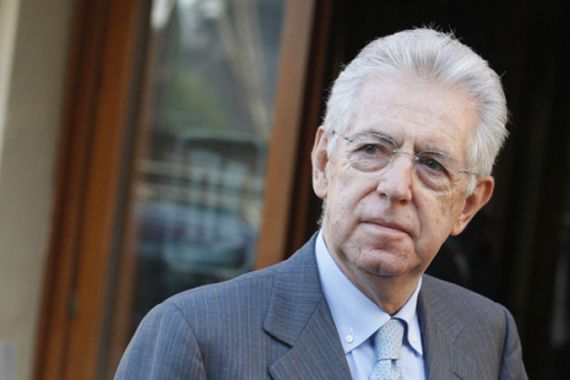Italian PM Monti to present austerity plan
Mario Monti prepares to unveil new austerity measures, as protesters fearing budget cuts clash with police.

 |
| Monti, fifth from left, has unveiled a cabinet of technocrats but revealed little about his economic plans [Reuters] |
The newly appointed Italian prime minister, Mario Monti, is set to outline austerity measures aimed at restoring
investor confidence in the country’s strained public finances, as workers and students take to the streets in protest of expected budget cuts.
The former European Commissioner, who took office on Wednesday, will present his plans to the senate on Thursday, before a confidence vote in the evening.
He will seek a separate vote of confidence in the lower house on Friday.
Monti, who has unveiled a cabinet of technocrats, has revealed little about his plans, but they are expected to follow demands made by the EU.
| Italy’s technocratic government |
|
|
Monti has been entrusted with the task of reducing a public debt of $2.6tn and restoring economic growth.
With Italy at the heart of the eurozone debt crisis, the measures he announces are unlikely to be enough on their own to rebuild shattered market confidence.
But they will be vital to restoring credibility with international partners who had long lost patience with the repeatedly unfulfilled promises of Monti’s predecessor, Silvio Berlusconi.
Monti took the key economy and finance portfolio himself and appointed Corrado Passera, chief executive of Intesa Sanpaolo, one of Italy’s big two banks, as industry minister in an unelected cabinet which contained no politicians.
Policies such as reforming a system that allows many Italians to claim a pension before the standard retirement age of 65 and loosening hiring and firing rules that protect some workers, but discourage job creation are among possible measures.
There has also been speculation about a wealth tax on privately held assets, possibly including first homes, a measure that has been strongly opposed by Berlusconi’s centre-right party but which unions and the left have urged repeatedly.
Monti said on Wednesday he was confident his new government would help restore confidence to panicked financial markets, but the task he faces was underlined by the continued surge in Italian bond yields.
Yields on 10-year bonds were more than seven per cent, near the levels that forced Greece and Ireland to seek an international bailout, which would overwhelm the euro zone’s current financial defences if it were needed by Italy, the bloc’s third largest economy.
European leaders have welcomed the appointment of Monti, a sober and reserved economist and tough negotiator with a decade of experience as European Commissioner.
French President Nicolas Sarkozy welcomed the appointment while German Chancellor Angela Merkel said she would meet Monti as soon as possible.
Jean-Claude Juncker, chairman of the euro zone finance ministers group, said he was particularly pleased that Monti had taken the finance portfolio himself. He described Monti as “the man for the situation”.
Monti has said he wants to serve until the next scheduled elections in 2013, but the refusal of the main parties to allow politicians to join his cabinet could make it harder to gain popular support for measures designed by unelected technocrats.
Protests and clashes
Monti’s choice of unelected experts to lead the government and the prospect of tough reforms have fueled unrest among some Italians.
Students clashed with police across Italy on Thursday in protests against budget cuts, while transport strikes idled buses and trains.
Police in riot gear scuffled with students in Milan, where they planned to march to Bocconi University, which forms Italy’s business elite. Monti is Bocconi’s president.
“The government of the banks,” read one placard held by a youth marching in the protest in Milan.
In Palermo, Sicily, demonstrators hurled eggs and smoke bombs at a bank, and protesters threw rocks at police who battled back with pepper sprays, the Italian news agency ANSA said.
One protester was injured in the head in Palermo, where police charged demonstrators who were trying to occupy another bank, it said.
In Rome, hundreds of students gathered outside Sapienza University, while others assembled near the main train station. They planned to march to the Senate.
Antonio Romano, who was distributing leaflets to protesters, said the government’s strategy was to “make the workers and retired people pay for the crisis, not those who provoked the crisis, I mean big business, bankers”.
University and high school students, as well as young people unable to find full-time jobs joined the protest.
In Rome, marcher Titti Mazzacane said she was skeptical about the new government. While Monti chose “decent and competent people,” the government “is a little bit too free-market liberal. I am a bit scared,” said the 53-year-old elementary school teacher.
 Mario Monti – Prime minister and economy minister. Former European Commissioner
Mario Monti – Prime minister and economy minister. Former European Commissioner